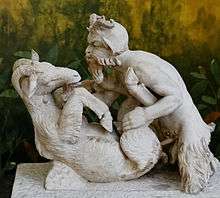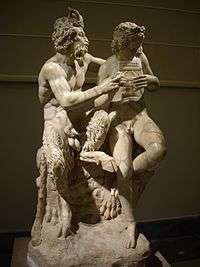Faunus
In ancient Roman religion and myth, Faunus [fau̯nʊs] was the horned god of the forest, plains and fields; when he made cattle fertile he was called Inuus. He came to be equated in literature with the Greek god Pan.
Faunus was one of the oldest Roman deities, known as the di indigetes. According to the epic poet Virgil, he was a legendary king of the Latins. His shade was consulted as a goddess of prophecy under the name of Fatuus, with oracles[1] in the sacred grove of Tibur, around the well Albunea, and on the Aventine Hill in ancient Rome itself.[2]
Marcus Terentius Varro asserted that the oracular responses were given in Saturnian verse.[3] Faunus revealed the future in dreams and voices that were communicated to those who came to sleep in his precincts, lying on the fleeces of sacrificed lambs. W. Warde Fowler suggested that Faunus is identical with Favonius,[4] one of the Roman wind gods (compare the Anemoi). Faunus is very probably of Indo-European origin, which he shares with the Vedic god Rudra.[5]
Etymology
There are a number of theories on the origin of the name Faunus. Most scholars of historical linguistics connect Faunus with the notion of divine favour (Latin 'favere' - to be favourable, inclined).[6] Faunus thus means favourable or propitious. Another theory claims that Faunus is the Latin outcome of a PIE *dhau-no- meaning "the strangler" and denotes the wolf. According to D. Briquel ("Le problème des Dauniens" in MEFRA 1974) it is likely that the Luceres, one of the three tribes of Rome, were Daunians from Ardea, as well as the characters of the Aeneis Mezentius, Messapus and Metabus, who show a Daunian origin. A. Pasqualini agrees on the presence of a Daunian connection in the towns of Latium claiming a Diomedean descent. Moreover, it would seem that there is a sizable presence of Daunians in Latium and Campania (Liternum, Nola). Festus 106 L records a king Lucerus who helped Romulus against Titus Tatius. Moreover, Oscan epithet Leucesius (present also in the Carmen Saliare) and Lucetius (Servius Aen. IX 570 "a luce") should be interpreted as related to the Luceres. He also lists the Leucaria mother of Romos (Dionysius of Halicarnassus I 72), Jupiter Lucetius, toponyms Leucasia /Leucaria (Pliny III 8 (13) 85; Dion. Hal. I 53) near Paestum, the ethnonym Lucani. Though Briquel is apparently unaware that the etymology of both "Luceres", Lucera, Leucaria, Lucani and Dauni is from a word meaning wolf and therefore different from that of Leucesius/ Lucetius, i.e. from IE from *luq (wolf), not from *leuk light: compare also Hirpini and Dauni. Daunos according to Walde Hoffmann [7] is from IE root *dhau to strangle, meaning the strangler, epithet of the wolf: cfr. Greek thaunos, thērion Hes., Phrygian dáos, lykos Hes., Latin F(f)aunus. According to Alessio Latins and Umbrians both did not name the wolf because of a religious taboo, thence their use of loanwords such as lupus in Latin (which is Sabine, instead of the expected *luquos) and the Umbrians hirpos (cfr. Hirpini) originally male goat instead of expected *lupos, whence also herpex for hirpex tool in the shape of wolf teeth.
Consorts and family

In fable Faunus appears as an old king of Latium, grandson of Saturnus, son of Picus, and father of Latinus by the nymph Marica (who was also sometimes Faunus' mother). After his death he is raised to the position of a tutelary deity of the land, for his many services to agriculture and cattle-breeding.
A goddess of like attributes, called Fauna and Fatua, was associated in his worship. She was regarded as his daughter, wife, or sister.[8] The female deity Bona Dea was often equated with Fauna.
As Pan was accompanied by the Paniskoi, or little Pans, so the existence of many Fauni was assumed besides the chief Faunus.[8] Fauns are place-spirits (genii) of untamed woodland. Educated, Hellenizing Romans connected their fauns with the Greek satyrs, who were wild and orgiastic drunken followers of Dionysus, with a distinct origin.
Equivalence with Pan
With the increasing Hellenization of literate upper-class Roman culture in the 3rd and 2nd–centuries BC, the Romans tried to equate their own deities with Greek ones, applying in reverse the Greeks' own interpretatio graeca. Faunus was naturally equated with the god Pan, who was a pastoral god of shepherds who was said to reside in Arcadia. Pan had always been depicted with horns and as such many depictions of Faunus also began to display this trait. However, the two deities were also considered separate by many, for instance, the epic poet Virgil, in his Aeneid, made mention of both Faunus and Pan independently.
Festivals
In Justin's epitome, Faunus is identified with Lupercus ("he who wards off the wolf"), otherwise a priest of Faunus. Livy named Inuus as the god originally worshiped at the Lupercalia, February 15, when his priests (Luperci) wore goat-skins and hit passers-by with goatskin whips.
Two festivals, called Faunalia, were celebrated in his honour—one on February 13, in the temple of Faunus on the island in the Tiber, the other on 5 December, when the peasants brought him rustic offerings and amused themselves with dancing.[2]
A euhemeristic account made Faunus a Latin king, son of Picus and Canens. He was then revered as the god Fatuus after his death, worshipped in a sacred forest outside what is now Tivoli, but had been known since Etruscan times as Tibur, the seat of the Tiburtine Sibyl. His numinous presence was recognized by wolf skins, with wreaths and goblets.
In Nonnos' Dionysiaca, Faunus/Phaunos accompanied Dionysus when the god campaigned in India.
Later worship
Faunus was worshipped across the Roman Empire for many centuries. An example of this was a set of thirty-two 4th-century spoons found near Thetford in England in 1979. They had been engraved with the name "Faunus", and each had a different epithet after the god's name. The spoons also bore Christian symbols, and it has been suggested that these were initially Christian but later taken and devoted to Faunus by pagans. The 4th century was a time of large scale Christianisation, and the discovery provides evidence that even during the decline of traditional Roman religion, the god Faunus was still worshipped.[9][10]
Notes
- ↑ For oracular Faunus, see Virgil, Aeneid vii.81; Ovid, Fasti iv.649; Cicero, De Natura Deorum ii.6, iii.15 and De Divinatione i.101; Dionysius of Halicarnassus v.16; Plutarch, Numa Pompilius xv.3; Lactantius Institutiones i.22.9; Servius on the Aeneid viii.314.
- 1 2 Peck 1898
- ↑ Varro, De lingua latina vii. 36.
- ↑ W. Warde Fowler (1899). The Roman Festivals of the Period of the Republic: An Introduction to the Study of the Religion of the Romans. London: Macmillan and Co. p. 259. Retrieved 2007-06-07.
- ↑ Nečas Hraste, Daniel; Vuković, Krešimir. "Rudra-Shiva and Silvanus-Faunus: Savage and Propitious". The Journal of Indo-European Studies. 39 (1/2): 100-15.
|access-date=requires|url=(help) - ↑ Nečas Hraste, Daniel; Vuković, Krešimir. "Rudra-Shiva and Silvanus-Faunus: Savage and Propitious". Journal of Indo-European Studies. 39 (1–2): 102.
|access-date=requires|url=(help) - ↑ LEW third ed. I p. 468, as cited by G. Alessio "Genti e Favelle dell'antica Apulia" In Archivio Storico Pugliese 1949 p. 11.
- 1 2 Peck 1898.
- ↑ Hutton, Ronald. The Pagan Religions of the Ancient British Isles. (1991) Blackwell ISBN 0-631-17288-2. Page 260-261
- ↑ Ronald Hutton (1988) Antiquaries Journal
- ↑ Papias, Elementarium: Dusios nominant quos romani Faunos ficarios vocant, as quoted by Du Cange in his 1678 Glossarium mediae et infimae latinitatis (Niort: Favre, 1883–1887), vol. 3, online; Katherine Nell MacFarlane, "Isidore of Seville on the Pagan Gods (Origines VIII. 11)," Transactions of the American Philosophical Society 70 (1980), pp. 36–37.
References
- Peck, Harry Thurston, 1898. Harpers Dictionary of Classical Antiquities (On-line)
- Hammond, N.G.L. and Scullard, H.H. (Eds.) 1970. The Oxford Classical Dictionary (Oxford: Oxford University Press) ISBN 0-19-869117-3.
Nečas Hraste, D. and Vuković, K. 2011. "Rudra-Shiva and Silvanus-Faunus: Savage and Propitious". The Journal of Indo-European Studies 39.1&2: 100-15

